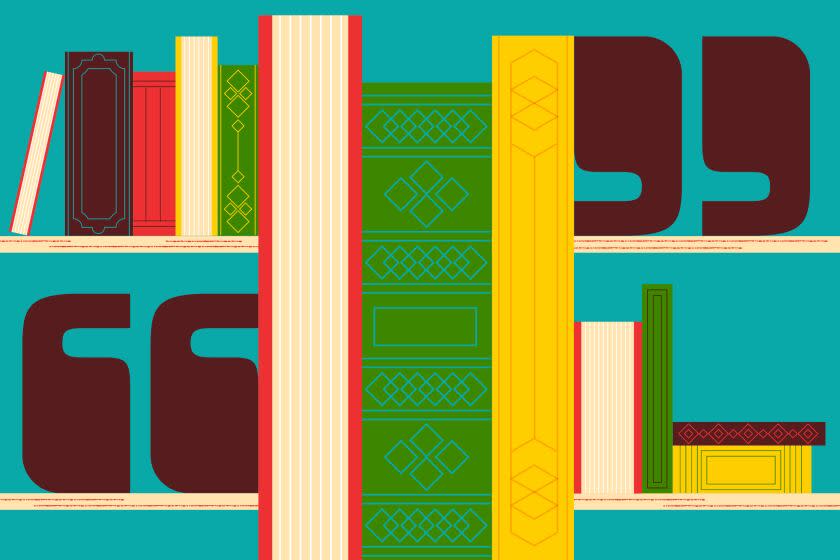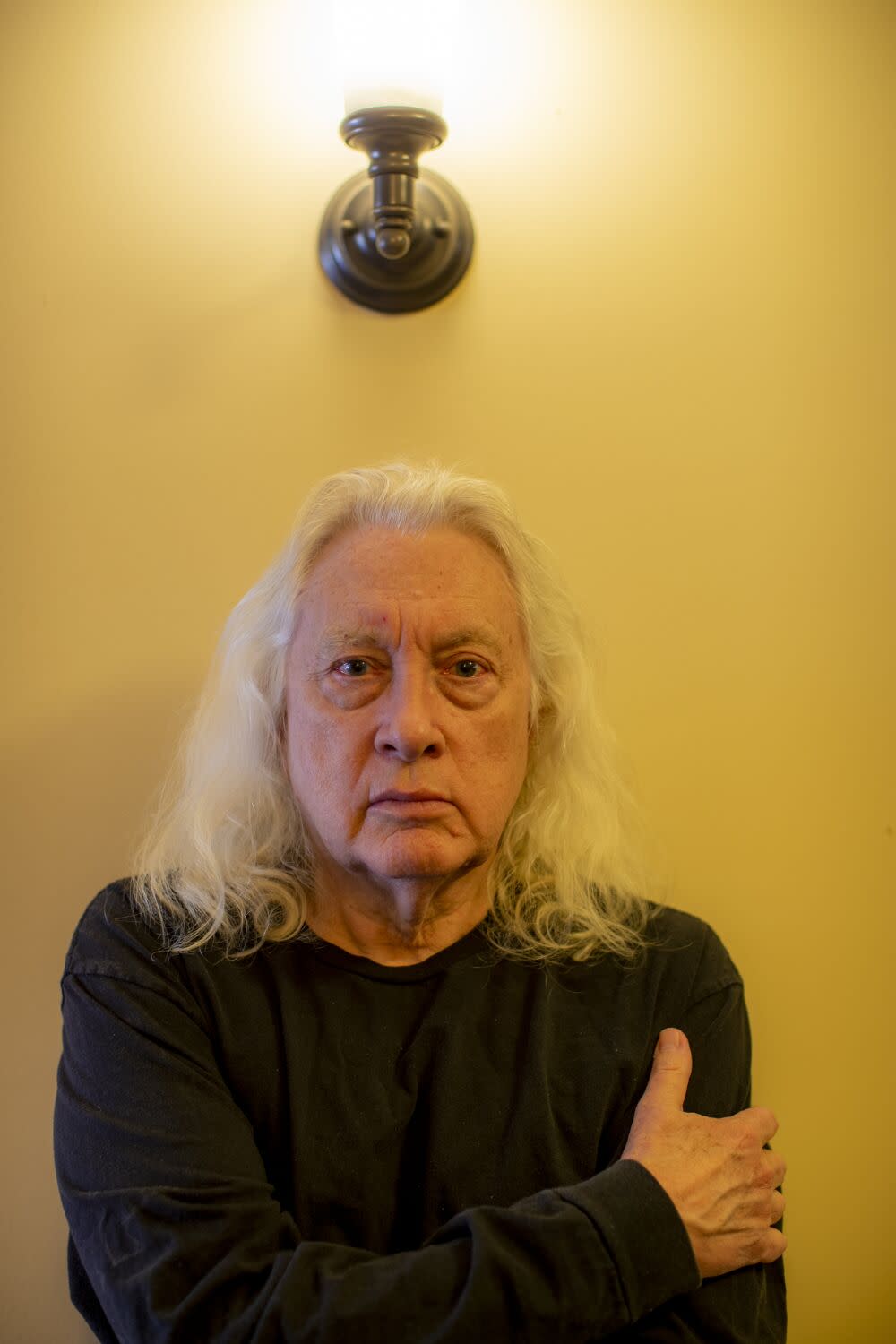L.A.'s writers make their case for their absolute favorite books on the city

For our Ultimate L.A. Bookshelf, we asked writers with deep ties to the city to name their favorite Los Angeles books. Here are our own favorite responses from among the 95 writers who offered their recommendations.
…
“You can't write crime fiction in Southern California without reading Raymond Chandler first. Now, the truth is, I'm not the biggest Chandler fan on the planet — I'm a Hammett guy — but 'The Big Sleep' is irresistible. Marlowe arrives on the page fully-formed, the dialogue sings, and L.A. becomes a character from Page 1 — a true master class in voice and style.”
— Tod Goldberg
“Two standouts: Nathanael West's 'The Day of the Locust' and Dorothy Hughes' 'In a Lonely Place." Both writers aimed to put their finger on the sense of dislocation felt by newcomers to L.A. in the ’30s and ’40s, a subject also plumbed by Chandler. In West, every character is out of place — an Ivy Leaguer beguiled by Hollywood, a vaudeville hoofer reduced to door-to-door selling, a Midwesterner lured to California for his health, a suspiciously mature child actor. In Hughes, protagonist Dix Steele is working hard to hide his secret life and character from his friends and acquaintances by prowling the empty corners of L.A. late at night. ... Never has a depopulated landscape been made to seem so sinister.”
— Michael Hiltzik
"Tight, sharp novels by Didion, Babitz and Dorothy B. Hughes have really spoken to me. I like the books that show a smaller slice of the city — the shadows beneath the sunlight. I am drawn to books that don't try to capture the entire city but distinct areas, that don't try to summon Los Angeles as a whole. That is a futile endeavor. What we need is a panorama of authors writing in an array of genres to even make a dent in conveying 'Los Angeles' to an outsider."
— Ivy Pochoda
“The books by emigrés — Aldous Huxley, Evelyn Waugh, Christopher Isherwood, Thomas Mann and others. Even West falls into this category. The foreigners don't count in most people's L.A. canon, but they spoke to a kid raised among immigrants. I grew up among ‘foreigners.’”
— Dana Gioia
“Evelyn Waugh's 'The Loved One' and Aldous Huxley's 'After Many a Summer [Dies the Swan]' snuck dark comedy onto the serious shelves (can we imagine Terry Southern or even Thomas Pynchon without them?).”
— Boris Dralyuk
"It's hard to overlook 'The Crying of Lot 49,' simply because no one will ever wrap an L.A. story from the ’60s around Elizabethan revenge drama and evoke paranoia, a terrifying sense of connectedness, and juiced-up altered states so commandingly as Thomas Pynchon, our writer on Olympus."
— Pico Iyer
"One of my favorite L.A. history books is 'Central Avenue Sounds,' a lively collection of oral histories told by jazz musicians who were part of the L.A. scene during the second wave of the Great Migration. Some were born here, others traveled here from their various birthplaces chasing something — a dream, or simply peace of mind. I love this chorus of voices through a lens of music. Which reminds me that it's time to go back and read Art Pepper's harrowing jazz memoir, 'Straight Life.'"
—Lynell George

"For a long time — I mean well into my 30s — I avoided reading certain writers on Los Angeles for the very reason that I didn't want to be influenced by them. I came late to, say, Chandler, for this reason. But Steve Erickson's novels were an enormous influence on me when I was just getting started. They helped me see that the Los Angeles I lived in was not — at all — comprehensive, and that there are, in fact, infinite ways this place might be depicted. Erickson is a great — truly great — American writer."
— Matthew Specktor
"'Literary fiction' is a fake category concocted in New York. There is no L.A. 'literary fiction' and thank God for that. Let the snobs stay on the East Coast."
— Steve Erickson
“My two favorites were written by my mother, Carolyn See. 'Golden Days' still feels like a snapshot of our lives together in Topanga. My mother was terrified of nuclear war. We even moved to Mexico after the Cuban Missile Crisis because she thought we'd somehow be safe there. ... I know that's her most well-known and popular book, but my personal favorite is 'The Handyman.' On the surface it looks like it's about a young man at loose ends who becomes a handyman to earn a little money, but really it's about how a person becomes an artist. The main character, Bob Hampton, travels from neighborhood to neighborhood — and all the places my mother lived in Los Angeles from the time she was born until the day she died. He's not a very good handyman, but he's good at fixing people's lives.”
—Lisa See
"I saw Paul Beatty read from 'The White Boy Shuffle' during the Asian American Writers' Workshop 'After 1989' series. Beatty read the passage where a mixed-race Black Korean store owner in L.A., in a moment of racial confusion during the Rodney King uprising, sets her own store on fire. I was shocked, I was laughing. Could fiction about something as heavy and traumatic as the L.A. unrest be funny? Could a novel do what the best stand-up does and make you uncomfortable but aching for the next line?"
— Ryan Lee Wong
"Richard Armour wrote 'It All Started With Columbus' and other satirical send-ups of history, and when I was a seventh or eighth grader I found his stuff hilarious. I deliberately tried writing in his style and was thrilled when he responded to a fan letter from me — and encouraged me to keep writing. Ever since then, I've tried to remember that simple encouragement he gave me and how it fueled my eventual career."
— Steve Padilla
“Southern California is not just Los Angeles — it’s millions of people, in hundreds of small towns veined by asphalt but held together by the cartilage of love and chosen family. In a historical tour, in landmark novels, I'd choose 'If He Hollers Let Him Go' by Chester Himes, 'Mildred Pierce' by James M. Cain and 'City of Night' by John Rechy. Then I'd move to 'A War of Eyes' by Wanda Coleman, 'Golden Days' by Carolyn See for the 1970s; shift to 'Locas' by Yxta Maya Murray, 'Paint It Black' by Janet Fitch and 'The Tattooed Soldier' by Héctor Tobar. Bebe Moore Campbell's 'Brothers and Sisters' and Jervey Tervalon's 'Understand This' give readers South-Central L.A. like no other novels; in the hills, I'd reread 'The Player' by Michael Tolkin, head into Garden Grove for 'The Sympathizer' by Viet Thanh Nguyen and on into El Monte for 'Every Night Is Ladies' Night' by Michael Jaime-Becerra.”
— Susan Straight
"How can one write about what they love about Los Angeles without feeling the influence of Jonathan Gold? His deep appreciation for not just the ‘it’ restaurants that most critics reviewed prior to him, but the strip mall joints and food trucks and so much more that gives L.A. its true texture and identity still influences me. I like exploring as many facets of L.A. as a literary city as possible, including lifting up the less seriously regarded genres. I am as likely to recommend a romance novel as a piece of literary fiction, and while some of that is my own egalitarian nature, it is Gold’s example that makes me feel comfortable in doing so publicly and not just one-on-one in my work as a bookseller.”
— Katie Orphan
"The late, beloved Eric Priestley, denizen of Watts and Leimert Park, and before that rural Louisiana, wrote a novel that came out in ’85: 'Raw Dog.' But really it's a memoir. It moves between Louisiana and Los Angeles from the ’40s into the ’60s, and it's a powerful, affecting and disturbing story involving the abuse and final triumph — or, survival at least — of a gifted child with an unlikely love for classical music. But that's only one aspect. This isn't a Billy Elliot story, with one simple problem to solve. It's a study of two worlds in a certain era of American history — no, more than two worlds, the family's the third world. I was more moved by this book, and learned more from it, than from some others by acclaimed and successful authors."
— Suzanne Lummis
"Los Angeles is nuanced, layered, easy, complicated, violent, kind, charming and ugly all at once. There could never be one book that can tell our whole story."
— Jessica Ceballos y Campbell
This story originally appeared in Los Angeles Times.
